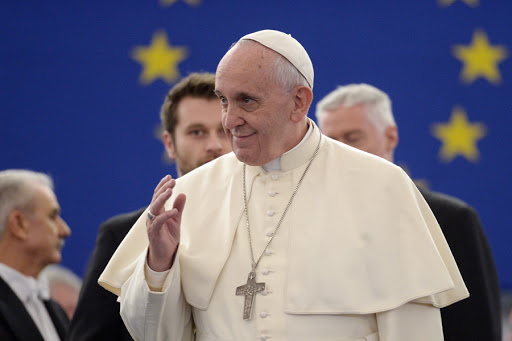The Church is not like a Parliament or Congress, with left-wing and right-wing factions, says Pope Francis. While we can fall prey to these “worldly temptations,” the Church is not this.
The Pope said this November 13 when he was speaking to two journalists who cover news of the Vatican.
Valentina Alazraki, a Mexican journalist who has been covering Church news for 47 years — the Pope joked she came on papal flights “straight after her First Communion!” — and Philip Pullella, an American who works for Reuters, both received recognition for their service.
In giving them their recognition, the Holy Father took advantage to recall a key point about the identity of the Church.
And, please, remember also that the Church is not a political organization with left and right-wingers, as is the case in parliaments. At times, unfortunately, our considerations are reduced to this, with some root in reality. But no, the Church is not this.
It is not a large multinational company headed by managers who study at the table how best to sell their product. The Church does not build itself on the basis of its own project, it does not draw from itself the strength to move forward and it does not live by marketing strategies.
Every time she falls prey to this worldly temptation – and at times she falls, or has fallen – the Church, without realising it, believes she has a light of her own and forgets that she is the “mysterium lunae” of which the Fathers of the early centuries spoke – she is authentic only in the light of Another, like the moon – and so her action loses vigour and serves no purpose. The Church, composed of men and women who are sinners like everyone else, was born and exists to reflect the light of Another, the light of Jesus, just as the moon does with the sun. The Church exists to bring the word of Jesus to the world and to make possible today the encounter with the living Jesus, making herself a vehicle for his embrace of mercy offered to all.
More than a job
Pope Francis’ address to the journalists reflected his esteem for the role they carry out. Journalism is about “embarking on a mission” more than choosing a profession, he said, a bit like a doctor, who “studies and works so that the evil in the world may be healed.”
“Your mission is to explain the world, to make it less obscure, to make those who live in it less afraid of it and look at others with greater awareness, and also with more confidence,” he told them, acknowledging that “it is not an easy mission.”
What can you offer not already on the web?
He organized his reflection with three words, as he often does. The words were listen, investigate, and report.
Regarding the second, he pointed out the high mission of a journalist, and particularly in our day:
The second, to investigate, is a consequence of listening and seeing. Every piece of news, every fact we talk about, every reality we describe needs to be investigated. At a time when millions of pieces of information are available on the web, and when many people obtain their information and form their opinions on social media, where unfortunately the logic of simplification and opposition sometimes prevails, the most important contribution that good journalism can make is that of in-depth analysis.
Indeed, what more can you offer to those who read or listen to you than what they already find on the web? You can offer the context, the precedents, the keys to interpretation that help to collocate the fact that has happened.
He also reflected on the importance of reality.
Reality is a great antidote to many “ailments.” Reality – what happens, the lives and testimonies of people – deserves to be told. […] Today we are in great need of journalists and communicators who are passionate about reality, capable of finding the treasures often hidden in the folds of our society and recounting them, allowing us to be impressed, to learn, to broaden our minds, to grasp aspects that we did not know before.
Sexual abuse victims
In this regard, he thanked the journalists for “what you tell us about what goes wrong in the Church, for helping us not to sweep it under the carpet, and for the voice you have given to the victims of abuse: thank you for this.”


